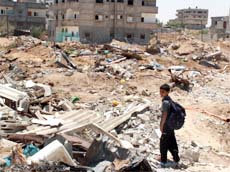As the Israeli disengagement from the Gaza Strip draws to a close, hopes for economic prospects in this impoverished, strife-torn land have been renewed.
Already, the EU has pledged investments in
The
But
According to the World Bank, a lot more than dollars and disengagement is needed if the Palestinian economy, now a shambles, is to revive.
"Disengagement in and of itself will not make an appreciable difference to the prostrate Palestinian economy," said World Bank country director Nigel Roberts.
A December report issued by the bank warned that if the Israeli closure regime that has crippled the Palestinian economy was not changed, poverty and alienation would deepen.
Quick dismantlement
For the economy to benefit from disengagement, these border closures will have to be dismantled quickly, Roberts said.
"Restrictions on the movement of Palestinian goods and people imposed during the intifada … have so severely distorted and compressed the functioning of the economy that returns on investment are now for the most part negligible."
The high cost of crossing the borders has made it more expensive to ship goods between Palestinian cities than from
"If you get a product out from Nablus to Ram Allah, because it has to go through the back-to-back system of service delivery, it's much cheaper to ship something from Ashdod (Israel) to China," said Sani Daher, CEO of Paltrade, the private-sector, government-mandated national trade promotion association of Palestine.
Costs of trade
Daher continued: "So you can see the effect this has on our economy. Under the 'back-to-back' system, goods must be unloaded from one truck, extensively checked and reloaded to another truck.
"The process, which can take two days to two weeks, increases the costs of trade in
Paltrade faces the formidable task of developing Palestinian trade as a driving force for a sustainable economy, while every aspect of that economy is under the control of an outside power.
The trade organisation works with key Palestinian businesses, helping them develop a strategy to become more competitive and meet market access requirements. But Daher fears the organisation’s work will be rendered meaningless by Israeli restrictions.
"I think our efforts without freedom of movement of goods and people to a certain extent will be moot because if there are physical impediments to the movement of goods, there is nothing we can do in terms of trade development and trade promotion," Daher told Aljazeera.net from the trade group's Gaza offices.
Inconclusive
So far, talks on changing the Israeli-controlled border regime have been inconclusive, according to the Palestinian Minister of Economy Mazen Sinnokrot, who met a Jordanian trade delegation on Sunday to discuss on trade relations.
"Up till now, discussions are going on in earnest, experts from the international community are present, representatives from the [
But so far we have not reached breakthroughs that we can report on the free movement of goods into Gaza," Sinnokrot said, adding that Israeli officials had turned down proposals by third-party security experts to update security screening techniques.
A slew of laws and regulations have been enacted in recent weeks to create incentives for investors - both Arab and Palestinian - to come to Gaza Strip.
Uncertainty
But Daher says pumping in foreign aid, on which
Uncertainty about the future is hindering growth.
"There are 4 billion US dollar of deposits in Palestinian banks from the Palestinians themselves in
"We don't need foreign direct investment. People aren't investing because they don’t see what would happen to their investments."
Others point to government mismanagement and say a clear economic strategy is lacking.
"We are facing a host of problems that render the prospects for a successful economy minimal," said Mahmud al-Farra, a Palestinian-American private investor who co-built the Palestinian Flour Mills and the Palestinian airport in the 1990s and lost much of his profit to a Palestinian Authority takeover of the mills in the late 1990s.
"First, there is no government planning. Second, people are simply not up to it - there is no appetite for investments. And, finally, the purchasing power is non-existent."
"We also have to ask ourselves - who is out of his mind enough to come invest in
Palestinian recovery
Echoing the December World Bank report, Daher said that a Palestinian recovery can only come through a change in the border regime followed by export development and a government strategy for economic development.
"If there’s a concerted effort to develop exports with a reformed border regime for facilitating the movement of goods, you could see a significant drop in unemployment as much as 11% by year 2006," he said.
Trade development and export development, in turn, will drive all other aspects of the economy, including investment.
"It's all linked to facilitating the movement of goods and people," Daher said.
Ultimately, the real test is in the West Bank, says Daher, whose fate he fears will mirror that of
"There's a reason why the unemployment in
Electric fence
After
The same back-to-back commercial crossing system used on
"It is like a bottleneck for the whole Palestinian economy in
"We expect that in a couple years you will see a similar surge in unemployment in the


 Home
Home Discover Islam
Discover Islam Quran Recitations
Quran Recitations Lectures
Lectures
 Fatwa
Fatwa Articles
Articles Fiqh
Fiqh E-Books
E-Books Boys & Girls
Boys & Girls  Ramadan
Ramadan Fatwa Audios
Fatwa Audios Month of Mercy
Month of Mercy Women
Women Eed Al- Fitr
Eed Al- Fitr Food Recipes
Food Recipes Videos
Videos

 Prayer Times
Prayer Times












